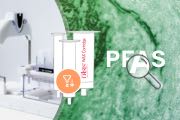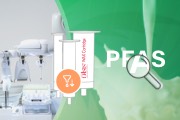PFAS testing
Name
Published by

Automation of PFAS Extraction in Firefighting Foam using SPE with Oasis WAX/GCB cartridges
Waters Corporation
This basic method provides the core methodology for translating a workflow into OneLab-executable script(s) as an attempt to fully or semi-automate a specific procedure. It demonstrates the benefits of automation and highlights OneLab capabilities and best practices to promote solution adoption, helping transition from manual to a more automated approach. It can be used alone or serves as a building block for a more complex workflow and is easily adaptable to users' requirements.
A major component of many Class B firefighting fluids (FFF) is PFAS, particularly aqueous film forming foams (AFFF). However, the concentration of PFAS in AFFF is extremely high. Preparing FFF samples for LC-MS/MS analysis involves many labor-intensive pipetting steps. An automated workflow is described in this protocol to improve laboratory efficiency and reduce human error using Andrew+ and Extraction+, along with Oasis WAX/GCB cartridges, which maximizes PFAS recovery while reducing matrix interferences for LC-MS/MS analysis.

This basic method provides the core methodology for translating a workflow into OneLab-executable script(s) as an attempt to fully or semi-automate a specific procedure. It demonstrates the benefits of automation and highlights OneLab capabilities and best practices to promote solution adoption, helping transition from manual to a more automated approach. It can be used alone or serves as a building block for a more complex workflow and is easily adaptable to users' requirements.
The European Food Safety Authority (EFSA) predicts that PFAS exposure is primarily through food. Milk, being the staple food product for toddlers and children, would affect them disproportionately compared to adults, so there is a need to monitor PFAS levels in milk.
In addition to using Andrew+ and Extraction+ for improved throughput and reduced errors, this method uses Oasis WAX SPE cartridges to enhance PFAS recovery and reduce matrix interferences for LC-MS/MS analysis. Automation also allowed for washing the walls of the sample vials with eluent, increasing the recovery of PFAS.
